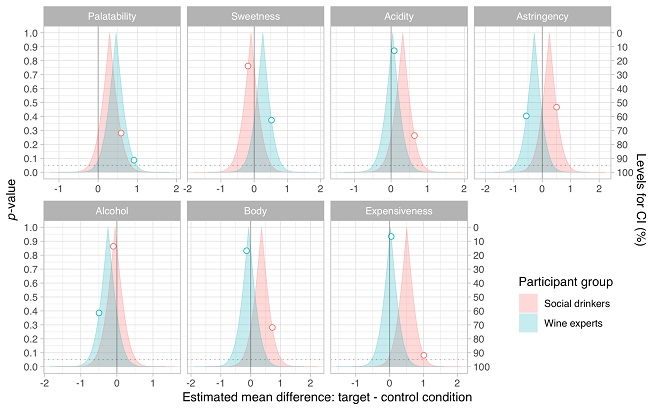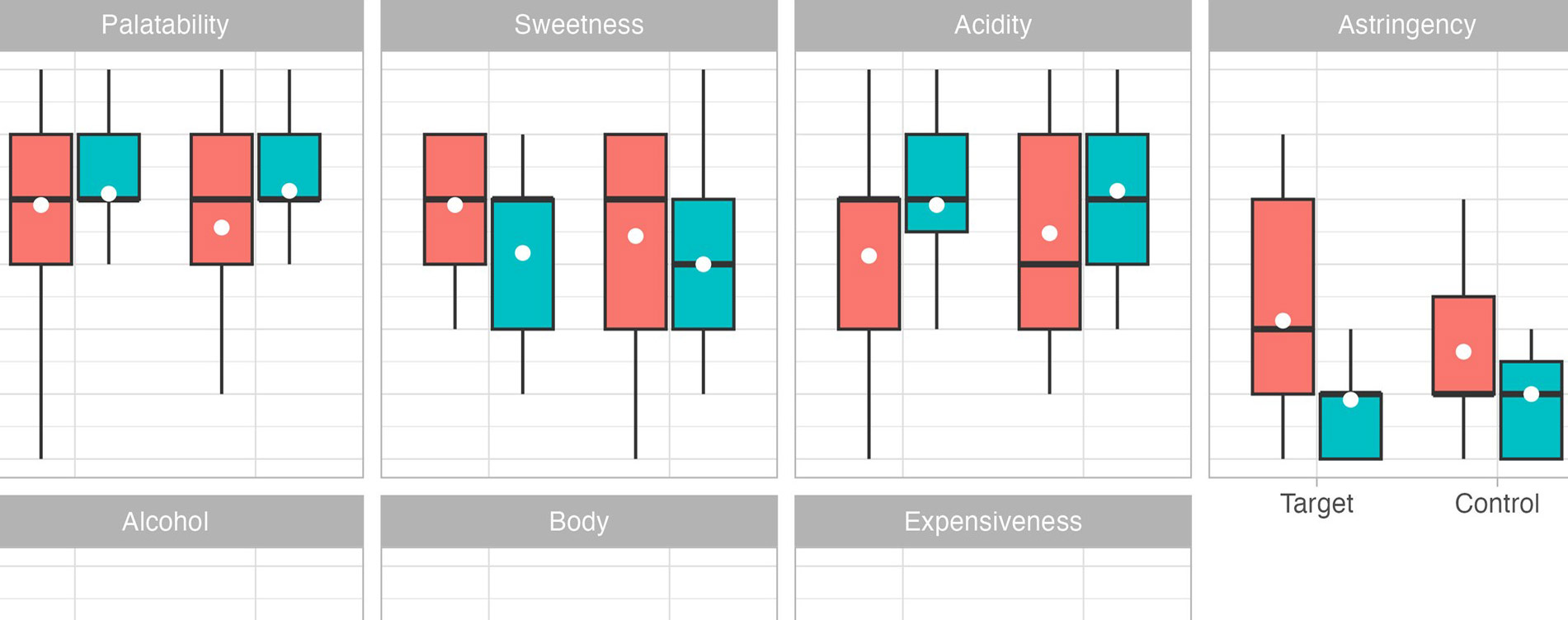But do the descriptors have any influence?
Yes, according to a new study from Japan.
Researchers there performed an experiment using a German Riesling from 2021 and a red Muscat Bailey A (MBA) from the 2019 vintage in Japan. Forty-six Japanese individuals (23 social drinkers and 23 wine experts) participated in the experiment and were presented with two glasses of Riesling wine and two glasses of MBA wine with different verbal descriptions.
One glass of Riesling/MBA wine was served with a description including its most distinct aroma (a ‘petrol’ note for the Riesling and a ‘strawberry candy’ note for the hybrid grape MBA). For the other glass, the description did not include this descriptor.
The participants were asked to taste the wines and rate their palatability, perceived sweetness intensities, acidity, astringency, alcohol sensation, body, and expensiveness on a seven-point scale.
The results demonstrated that the social drinkers rated the Riesling wine with the ‘petrol’ descriptor as heavier-bodied and more expensive compared to the same wine without the descriptor. The wine experts were not as influenced as the social drinkers, but the experts rated the Riesling wine with the ‘petrol’ descriptor as less expensive. In the case of the MBA wine with the ‘strawberry candy’ descriptor, the social drinkers rated it as more expensive, whereas the wine experts rated it as more palatable than the same wine without the descriptor.
The results indicated that verbal descriptions of wine aroma modulated the flavour perception and evaluation of wine, but the modulation effect varied between social drinkers and wine experts.
This research is in line with evidence from sensory and consumer sciences, which shows that extrinsic factors, such as information, can affect how we expect and perceive the flavour and quality of food and drinks. Such research shows:
- The strong impact of Champagne labelling on consumer evaluations and preferences. Consumers who could not discriminate Champagnes following blind tasting had significantly different preferences when the labels were revealed.
- Low-alcohol labelling has a negative impact on consumer perception. A reduced alcohol content claim on a low-alcohol wine label negatively affected both the expected and perceived quality of the wine. However, in a blind-tasting setting, the panels rated the quality of low-alcohol wine similar to that of regular wine.
- The price of wine, PDO information, and critics’ wine ratings have been demonstrated to affect consumers’ responses to and evaluations of wine.
- Information provided prior to or during tasting leads drinkers to develop particular expectations regarding the aroma/flavour and quality of wine, which modulate how wine is perceived and evaluated during tasting.
‘The use of the descriptor ‘petrol' for Riesling wine led to the perception of an enhanced body and sweetness’
Results
The impact of the ‘petrol’ descriptor on the perceptions and evaluations of Riesling wine
Figure 1. Boxplots of ratings for the Riesling wine.
White points represent the mean of ratings.

Figure 2. P-value functions of the estimated mean difference in the rating of Riesling wine between the target and control conditions.
When the Riesling wine was described as having a ‘petrol' note, the social drinkers perceived the wine as having a heavier body and being more expensive. It was also rated as being slightly more palatable and sweeter.
These results suggest that the use of the descriptor ‘petrol' for Riesling wine led to the perception of an enhanced body and sweetness, and these perceptual changes might have resulted in greater acceptance (ie, palatability) and higher quality assessment (ie, expensiveness). These results are also in line with previous findings that presenting proper and elaborate aroma descriptions increases consumers’ wine liking and willingness to pay for the wine.
Taken together, these findings suggest that verbally describing Riesling wine using the descriptor ‘petrol’ can positively enhance the experience of social drinkers.
Interestingly, the use of the descriptor ‘petrol’ led to a slight increase in its astringency rating among social drinkers – even though the sample wine did not have a noticeable astringent quality. The researchers reason that the social drinkers may have mistakenly attributed their trigeminal sensation caused by acidity to astringent sensation, possibly because of their impression of chemical products.
The wine experts were less influenced by the presence of the descriptor. The lower susceptibility of wine experts to verbal influence may be partly attributed to their well-established perceptual skills to taste and evaluate wines without relying on verbal memory or odour-naming skills. Although ratings of sensory properties remained unaffected, their quality assessment was affected to some extent; they rated the wine as less expensive when the descriptor ‘petrol' was present. The decrease in expensiveness rating may have been partly caused by the wine experts considering the ‘petrol' character in young Riesling wine to be a sensory defect. However, it should be noted that the palatability of the wine was not affected by the descriptor ‘petrol,' suggesting that, at least in this case, the verbal influence on wine experts is primarily cognitive (ie, quality assessment) rather than sensory or hedonic.
The impact of the ‘strawberry candy’ descriptor on the perceptions and evaluations of MBA wine

Figure 3. Boxplots of ratings for the MBA wine.

Figure 4. P-value functions of the estimated mean difference in the rating of MBA wine between the target and control conditions.
The researchers found that describing MBA wine with its distinct ‘strawberry candy' aroma has a positive impact on both wine experts and social drinkers. When MBA wine was described as having a ‘strawberry candy' note, the social drinkers rated the wine as more expensive. The researchers did not expect this result as they thought the term ‘candy' would lead social drinkers to see the wine as more approachable and less serious. A possible explanation, they say, is that the addition of the descriptor ‘strawberry candy' made the social drinkers perceive the wine as more complex, having a wide range of aroma characteristics, resulting in an increase in the expensiveness rating.
They also rated the wine as slightly more acidic, probably through the association of the term ‘strawberry' with its fresh, sharp acidity. The result also showed that the presence of the descriptor slightly enhanced the palatability of the wine, indicating that verbally describing MBA wine using the descriptor ‘strawberry candy' can positively enhance the experience of social drinkers.
Intriguingly, the descriptor ‘strawberry candy’ also slightly enhanced the astringency and body perceptions of social drinkers. The researchers suggest that the descriptor may have led some to expect a wine that was sweeter and more light-bodied whereas it was, in fact, completely dry.
The wine experts rated the wine as more palatable when the target descriptor was present. They also rated the wine as slightly sweeter and less astringent. During the debrief afterwards, many reported that once they saw the descriptor, they became confident that the wine was made from MBA grapes. This may have helped the experts form accurate taste/flavour expectations for the MBA wine (ie, sweet-smelling aroma and fewer tannins) and biased their perception to confirm that style, leading to greater acceptance of the wine.
The research paper ‘Verbal descriptions modulate flavour perception and evaluation of wine: An exploratory study using Riesling and Muscat Bailey A wines’ was published in OENO One (Vol. 58 No. 2, 2024). Click here to read the full paper.











.png)









